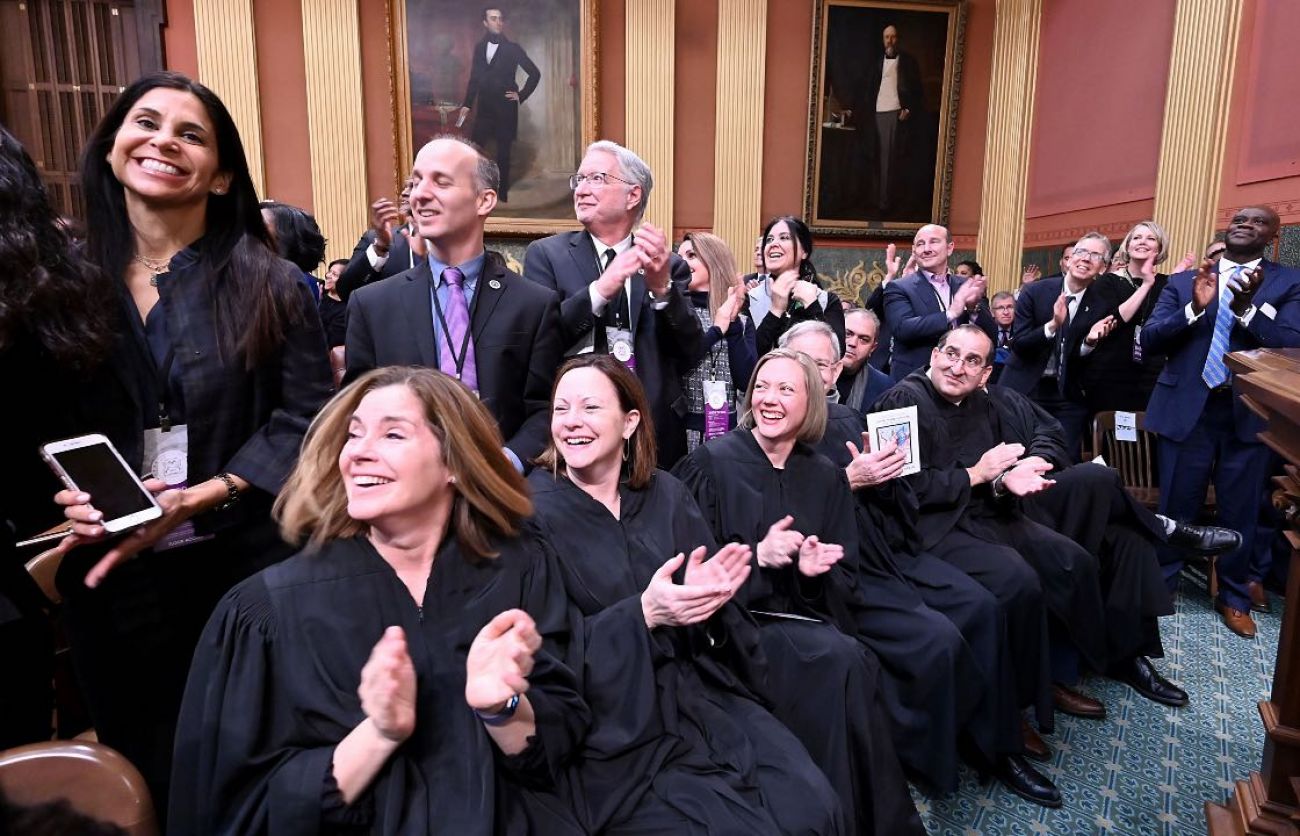Frustrated Gov. Whitmer vows no more ‘games’ with GOP on fixing Michigan






LANSING — Frustrated by inaction in a divided government, Gov. Gretchen Whitmer on Wednesday vowed to work around Republicans if necessary to solve some of Michigan’s biggest problems.
In her second State of the State speech, the Democratic governor said she’d fix state roads without the help of Republicans, protect the Affordable Care Act the national GOP is working to dismantle and circumvent an unpopular law they created that threatens to hold back 5,000 third-graders.
Bemoaning that legislative leaders didn’t work with her last year on serious road funding proposals, Whitmer unveiled a plan to borrow $3.5 billion over three years to fix state trunkline roads that doesn’t require approval of the GOP-led Legislature.
“For those of you who want to keep playing games, I’m going to press on without you,” she said during the 40-minute speech. “I’m going to use the power of my office to do what I said I was going to do.”
Republicans were quick to condemn Whitmer’s speech, with Michigan GOP Chairwoman Laura Cox calling it “more of the same empty promises for the future.”
The roads plan is "taxation without representation and it’s absolutely wrong,” Cox told reporters Wednesday night. “She’s being disingenuous when she said that the Legislature wouldn’t work with her."
Related articles:
- Gov. Whitmer launching effort to undercut Michigan’s third-grade reading law
- For state address in 2020, Michigan Gov. Whitmer still working on 2019 goals
Here are big takeaways from Whitmer’s speech:
$3.5 billion in road bonds over five years
After a first year marked by stalemate over a 45-cent-per-gallon gas tax increase, Whitmer’s centerpiece proposal would sidestep the Legislature by issuing $3.5 billion in bonds over five years for roads and bridges.
The proposal wouldn’t raise taxes, but it would generate far less money than her gas tax hike, which would have raised $2.5 billion per year.
“It’s time for Plan B,” Whitmer said Wednesday. “The problem remains. In fact, it’s worse because another year has passed. Michigan roads are among the most beat up and dangerous in the country.”
Bonding would require the state to take on significant debt and the revenue could only be able to be used on highways and interstates rather than local roads.
More than a quarter of Michigan highways are in poor condition, but others are worse — 41 percent of all federally funded paved roads in the state and 53 percent of state- and locally funded roads are in poor condition.
Republicans criticized the plan as a fiscally risky move that won’t provide stable funding
“This is not a long-term solution for our roads, simply taking out a loan and passing it on to our children,” Speaker of the House Lee Chatfield said. “I can’t take seriously as a long-term proposal.”
The spending is expected to be considered Thursday at the State Transportation Commission meeting.
Put Affordable Care Act changes in Michigan state law
A challenge to the Affordable Care Act (also known as Obamacare) is pending before the U.S. Supreme Court. If it gets struck down, it would be “disastrous for our state and devastating for our people,” Whitmer said.
There are nearly 400,000 Affordable Care Act participants in Michigan and nearly 670,000 people on Healthy Michigan. The administration said more than 1 million people would lose insurance if the ACA were struck down.
Whitmer said she hopes to protect against the possibility it will get struck down by getting lawmakers to include some elements of the federal law in state law.
Among those protections could be rate safeguards for those with pre-existing conditions and barring gender discrimination from insurance companies; coverage for mental health disorders and addiction treatment; coverage for “essential health benefits” such as immunizations, hospitalization and birth control.
Any protections would have to be approved at least in part by Republican lawmakers, who control both chambers of the Legislature.
Sen. Curtis Vanderwall, a Ludington Republican who chairs the Health Policy and Human Services Committee, said he’s willing to consider the governor’s health care proposals despite his distaste for the Affordable Care Act.
“Pre-existing conditions absolutely should be covered,” he said. “I don’t think any of us argue that part, but some of the other things she talked about became very regional very quick. The access to carrier issue in northern Michigan, my thought is if we’re going to attack those we need to be able to run them statewide.”
Rep. James Lower, R-Greenville, who sits on the House Health Policy Committee, also said he’d “definitely give it strong consideration.”
Third-grade reading exemptions
As Bridge Magazine first reported early Wednesday, Whitmer used her speech to unveil an initiative designed to undercut Michigan’s new third-grade reading law by helping struggling students avoid flunking and advance to the fourth grade.
The Whitmer administration is partnering with philanthropic foundations to help teach parents about exemptions to retention that are built into a law signed by her predecessor, Republican former Gov. Rick Snyder.
“This punitive law could be a nightmare for families, and this initiative will give parents and students the resources and support they need to get through it,” Whitmer said. “We can get ahead of this problem if we start early.”
The Michigan Department of Education estimates that 5,000 third-graders could be flagged for retention on the basis of the M-STEP test they will take this spring.
While details of the effort remain unclear, conservative groups who pushed for the third grade reading law as an accountability measure criticized the apparent attempt to help parents find workarounds.
“Michigan’s third-grade reading law provides students with the resources and supports they need to read at grade level before they leave the 3rd grade, and the governor’s aggressive attempts to undermine the law will cost many the chance at a brighter future,” said Beth DeShone, executive director of the Great Lakes Education Project.
Groups backing the parental education initiative include the Battle Creek Community Foundation, the Community Foundation of Greater Flint, the Max and Marjorie Fisher Foundation, the Skillman Foundation and the W.K. Kellogg Foundation.
Sen. Wayne Schmidt, R-Traverse City, who chairs the education appropriations subcommittee, said Whitmer’s efforts to get around the law are ironic because she vetoed $15 million for summer reading programs to support third graders who didn’t pass the statewide exam.
“We’re going to keep working,” Schmidt said. “I think the Legislature is more willing to work with her than she gives us credit for, and that’s a little frustrating.”
Find ways to lower prescription drug prices
Whitmer announced she’ll create a Prescription Drug Advisory Task Force. Made up of five bipartisan lawmakers, the group will be expected to report on ways to make prescription drugs more affordable by Aug. 15.
The task force will be asked to recommend ways to require more transparency from drug companies, report on the impact of expensive prescription drugs and explore what economic factors impact pricing.
According to the administration, marketing and advertising make up more than 30 percent of drug costs, while research and development make up only 17 percent.
Lawmakers are already exploring one way to potentially bring prices down by making it easier for Michiganders to import drugs from Canada, where they’re less expensive. Other states have introduced and passed legislation exploring other ways to bring costs down.
Expanded child care access, mom supports
Whitmer announced a push to expand access to child care subsidies and expand health care coverage for low-income moms. She’s expected to propose funding for the initiatives in the 2021 budget she presents to lawmakers next week.
Her child care plan would allow more families to qualify for subsidies by raising the annual income limit from 130 percent of the federal poverty level to 150 percent. That means a family of four could earn up to $39,300 and still qualify for the program, up from $34,060.
The governor’s “healthy moms, healthy babies” proposal would provide low-income moms with up to a full year of health care coverage after they give birth. Whitmer also wants to ensure new moms are guaranteed coverage for a postpartum visit within three weeks and a comprehensive medical checkup within 12 weeks.
The governor said she is also seeking new protections to let a woman “choose birth control that works for her” and increased access to substance abuse, mental health and home visitation programs for new moms.
“This will make a crucial difference for new moms and for the youngest Michiganders” she said. “And we’ll make an intensive effort to eliminate the disparities in care — for new moms of color especially. Because right now, black women in Michigan are three times more likely than white women to die of pregnancy-related causes. That is a staggering disparity.”
The funding of those proposals will be key, said Vanderwall, who questioned whether debt service payments for the governor’s new road funding plan will limit available revenues for other initiatives.
Lack of access to child care “is one of the biggest issues we have in northern Michigan,” the Ludington lawmaker said. “In theory, I’m very supportive.”
See what new members are saying about why they donated to Bridge Michigan:
- “In order for this information to be accurate and unbiased it must be underwritten by its readers, not by special interests.” - Larry S.
- “Not many other media sources report on the topics Bridge does.” - Susan B.
- “Your journalism is outstanding and rare these days.” - Mark S.
If you want to ensure the future of nonpartisan, nonprofit Michigan journalism, please become a member today. You, too, will be asked why you donated and maybe we'll feature your quote next time!




